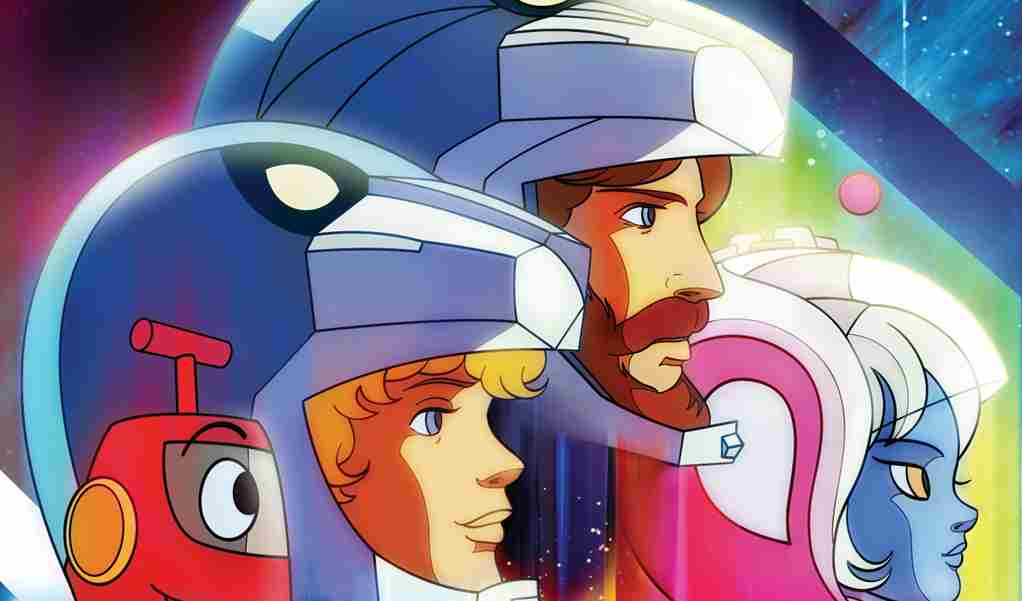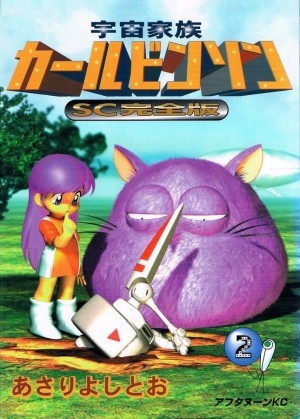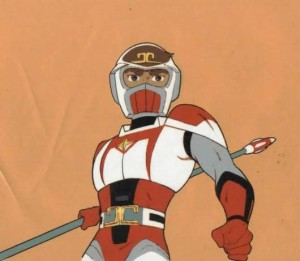Anime’s Sci-Fi Adaptations
August 2, 2016 · 0 comments
By Chris Perkins.
 Anime has had a long love affair with western literature. Since the early days of television, anime studios have adapted beloved stories from Europe and the Americas. Many of them were part of the long-running World Masterpiece Theatre strand which included such classics as Heidi, Anne of Green Gables, Little Women and Tom Sawyer. But for every straightforward adaptation, there are also anime that take a classic tale as their inspiration for their own, entirely different direction. This approach has brought us the concept of the sci-fi or fantasy adaptation, where an unlikely story is transformed into a whole new genre. After all, what story couldn’t be improved by the addition of spaceships, lasers and of course, giant robots?
Anime has had a long love affair with western literature. Since the early days of television, anime studios have adapted beloved stories from Europe and the Americas. Many of them were part of the long-running World Masterpiece Theatre strand which included such classics as Heidi, Anne of Green Gables, Little Women and Tom Sawyer. But for every straightforward adaptation, there are also anime that take a classic tale as their inspiration for their own, entirely different direction. This approach has brought us the concept of the sci-fi or fantasy adaptation, where an unlikely story is transformed into a whole new genre. After all, what story couldn’t be improved by the addition of spaceships, lasers and of course, giant robots?
Like almost everything else, this phenomenon could be said to go back to Osamu Tezuka. Although it ultimately took a path of its own, his most famous creation Astro Boy is at heart a sci-fi spin on Pinocchio. There are several parallels to the original tale, in Astro/Atom’s desire to be “a real boy” and his time spent in the circus.
 Some sci-fi anime are pretty faithful to their original sources, others… not so much. Space Family Carlvinson might have been inspired by Johan David Weiss’s 1812 novel Swiss Family Robinson, but it jettisons most of the original (along with the name) for the story of a girl castaway – this time in space – raised by a surrogate family of robots. A travelling theatre troop of performing robots, no less, while Carlvinson derived its name from the USS Carl Vinson, an American aircraft carrier newly arrived in the Pacific at the time the show was in production.
Some sci-fi anime are pretty faithful to their original sources, others… not so much. Space Family Carlvinson might have been inspired by Johan David Weiss’s 1812 novel Swiss Family Robinson, but it jettisons most of the original (along with the name) for the story of a girl castaway – this time in space – raised by a surrogate family of robots. A travelling theatre troop of performing robots, no less, while Carlvinson derived its name from the USS Carl Vinson, an American aircraft carrier newly arrived in the Pacific at the time the show was in production.
1997 TV series Hakugei: Legend of Moby Dick re-envisions Herman Melville’s classic novel as a story of salvagers hunting down abandoned spaceships, which in this universe are referred to as “whales”. Just as in the original, in this version Captain Ahab is obsessed with finding the white “whale” (the Moby Dick, naturally) responsible for the loss of his left eye and arm. On the other hand, The Wonderful Galaxy Of Oz is a pretty straightforward space-faring version of The Wizard Of Oz, albeit one where the tin-man is a robot and Dorothy is blonde.
Fans of a certain vintage will recall Ulysses 31, which was arguably the first anime sci-fi re-imagining to make a real impact in the west. The Franco-Japanese co-production took the story of The Odyssey and flung it into space in the far future. Ulysses was now the captain of a starship –named the Odyssey – sentenced by the Gods of Olympus to wander the stars in search of the planet Hades, in atonement for slaying the Cyclops. The 1981 series also added an annoying robotic sidekick, fearsome shark-men and one of the all time great theme-tune, ensuring it’s fondly remembered to this day.
Even Shakespeare has been mined for sf anime, notably in Gonzo’s Romeo X Juliet. The 2007 fantasy series relocated the star-crossed lovers to the floating island of Neo-Verona, and brought feisty swashbuckling, a cross-dressing Juliet and flying horses into the mix. This adaptation also added references and characters from elsewhere in Shakespeare’s canon, making it ideal for the anime fan who is also a drama junkie. There’s even a character based on Bill himself.
Gonzo’s first brush with classic literature however, was Gankutsuo (available in a shiny Blu-ray edition from Anime Limited) which is a sci-fi adaptation of Alexandre Dumas’s The Count Of Monte Cristo. Relocating events to a decadent future Paris, it features a blue-skinned, possibly vampiric version of the titular count, who hails from the moon. Mahiro Maeda’s version features a unique visual flair and a shift of protagonist that means that ultimately the addition of spaceships, aliens and vampires to the story is actually one of the least remarkable things about it.
 You’d be forgiven for assuming that Spaceketeers – shown in the US in as part of the anthology Force Five series – was based on another well-known Dumas work, The Three Musketeers. In fact, the original Starzinger was actually based on another entirely different classic story. The series was dreamt up by the legendary Leiji Matsumoto as a sci-fi spin on the classic Asian story Journey To The West, the novel that also loosely inspired Dragon Ball and the 1970s live-action TV show Monkey. Any association with the Dumas characters was absent from the original and was entirely a creation of Jim Terry’s dub.
You’d be forgiven for assuming that Spaceketeers – shown in the US in as part of the anthology Force Five series – was based on another well-known Dumas work, The Three Musketeers. In fact, the original Starzinger was actually based on another entirely different classic story. The series was dreamt up by the legendary Leiji Matsumoto as a sci-fi spin on the classic Asian story Journey To The West, the novel that also loosely inspired Dragon Ball and the 1970s live-action TV show Monkey. Any association with the Dumas characters was absent from the original and was entirely a creation of Jim Terry’s dub.
A good yarn is a good yarn, whether it takes place in the past or on some far-off planet in some distant future. And for Japanese audiences, stories from abroad also bring with them an extra layer of exoticism. Maybe in some cases, it’s just easier than coming up with an idea from scratch. Whatever the reason may be, it’s brought some pretty interesting results… and I see no reason that it can’t continue to do so for generations to come. Harry Potter in space, anyone?
Chris Perkins writes about anime for MyM magazine and is the editor of Animation For Adults.
Alexadre Dumas, anime, Gankutsuou, Gonzo, Japan, Leiji Matsumoto, Monkey, Romeo x Juliet, sci fi, SF, Spakeketeers, Ulysses 31
Leave a Reply